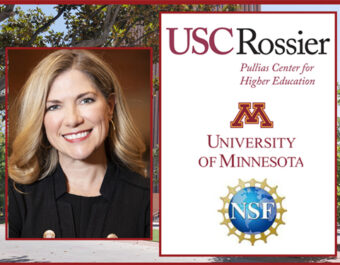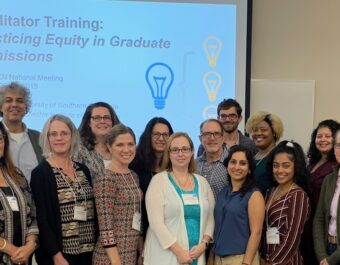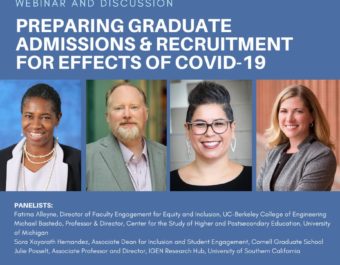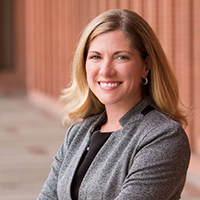Equity in Graduate Education | Research Team | Reports | Projects | Events | News
Background
A third of college graduates today go on to pursue graduate education. Graduate programs develop tomorrow’s faculty and many of society’s leaders, so addressing inequities in graduate education has important ripple effects throughout higher education and society.
Equity in Graduate Education is a research initiative at the Pullias Center focused on examining and improving institutional policy and practice, with special attention to the work of faculty members. Professors’ mindsets, values and disciplinary cultures have embedded inequities through standard practices for admissions and recruitment, teaching and mentoring, and broader judgments of student quality and merit.
We’re developing new theories and working in research-practice partnerships with major universities and disciplinary societies to shift the way that faculty evaluate and interact with graduate students. Our goals are to reduce barriers to graduate school and create more inclusive educational environments, especially for women, racially minoritized, and other marginalized students. The Equity in Graduate Education team promotes equity in graduate education through research on holistic graduate admissions practices and professional development that provides faculty and administrators with the tools and resources to create institutional change.
Projects
Alliance for Multicampus, Inclusive Graduate Admissions
A project to develop holistic review methods for graduate admissions at UC Davis and UCLA.
The Equity in Graduate Education Consortium
Initially begun as a project to to scale holistic graduate admissions practices to six California universities; now scaled-up to a national level and supporting equity in graduate education in the UK.
Inclusive Graduate Education Network
A study of faculty practices affecting access to and equity in STEM graduate education.
Cal-Bridge: A CSU-UC Bridge Program in Physics and Astronomy
A project that creates a pathway for students from underrepresented groups at 15 California State University campuses to PhD programs in physics and astronomy at nine University of California campuses.
News
More Equity in Graduate Education news
Events
No events scheduled at this time.
Pullias Research Team
Julie Posselt
Project Lead
Steve Desir
Director of Professional Development and Learning
Yasmin Kadir
Consortium Manager
Jimmy Aguilar
Research Assistant
Gloria Anglón
Research Assistant
Kaylan Baxter
Research Assistant
Past Team Members
Aireale Rodgers
Research Assistant
Theresa E. Hernandez
Research Assistant
Deborah E. Southern
Research Assistant
Cynthia Villareal
Research Assistant
Lauren Irwin
Research Assistant
Román Liera
Postdoctoral Research Associate
Whitney Tang
Research Assistant
Sarah Dobbs
Undergraduate Researcher
Maria Romero-Morales
Consortium Facilitator
Reports
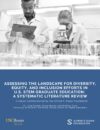
Assessing The Landscape For Diversity, Equity, and Inclusion Efforts in U.S. STEM Graduate Education: A Systematic Literature Review
Dr. Julie Posselt, Kaylan Baxter, and Whitney Tang
Pullias Center for Higher Education (2021)
More resources are being poured every year into efforts to broaden participation in STEM, and foundations and other resource providers need up-to-date evidence about what works in shaping individual and organizational outcomes. This report introduces such evidence, toward enabling the Alfred P. Sloan Foundation to develop the wisest investments in STEM graduate education. We present findings from a systematic review of 228 recently published research manuscripts and evaluation reports about efforts to advance diversity, equity, and/or inclusion by race, gender, and other social identities in STEM graduate education.
Categories: Graduate Education, Equity and Leadership
diversity equity and leadership graduate education stem
Download 4.71 MB 11261 Downloads
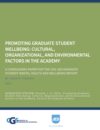
Promoting Graduate Student Wellbeing: Cultural, Organizational, and Environmental Factors in the Academy
Dr. Julie R. Posselt
Pullias Center for Higher Education (2021)
The purpose of this essay is to synthesize current knowledge about cultural, organizational, and environmental factors in higher education which are known to support or inhibit the wellbeing of graduate students. Given that students’ intellectual growth as graduate students is situated within a multi-dimensional developmental process, I pay special attention to ways that graduate education stakeholders-- including graduate school administrators, directors of graduate studies, faculty members, and other staff-- can link student development with the promotion of wellbeing. Finally, I make recommendations for colleges and universities to facilitate learning environments where students can thrive.
Categories: Graduate Education, Equity and Leadership
equity and leadership graduate education julie posselt
Download 608.78 KB 30611 Downloads
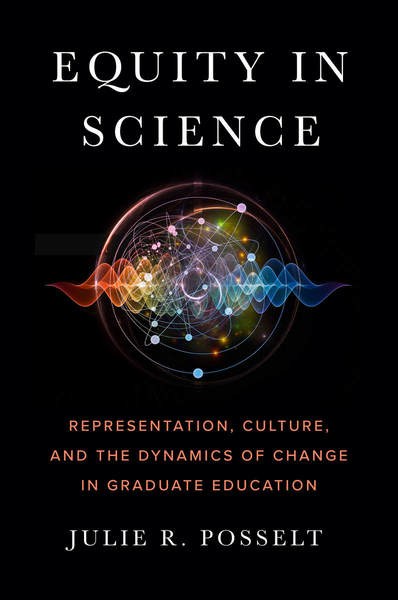 Equity in Science: Representation, Culture, and the Dynamics of Change in Graduate Education
Equity in Science: Representation, Culture, and the Dynamics of Change in Graduate Education
Stanford University Press, September 2020
Buy now: Amazon | Stanford UP
STEM disciplines are believed to be founded on the idea of meritocracy; recognition earned by the value of the data, which is objective. Such disciplinary cultures resist concerns about implicit or structural biases, and yet, year after year, scientists observe persistent gender and racial inequalities in their labs, departments, and programs.
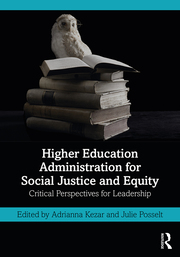 Higher Education Administration for Social Justice and Equity
Higher Education Administration for Social Justice and EquityRoutledge, October 2019
Buy now: Amazon | Routledge
Higher Education Administration for Social Justice and Equity empowers all administrators in higher education to engage in their work―to make decisions, hire, mentor, budget, create plans, and carry out other day-to-day operations―with a clear commitment to justice, sensitivity to power and privilege, and capacity to facilitate equitable outcomes.
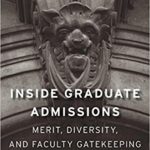 Inside Graduate Admissions: Merit, Diversity, and Faculty Gatekeeping
Inside Graduate Admissions: Merit, Diversity, and Faculty GatekeepingHarvard University Press, January 2016
Buy now: Amazon | Harvard UP
How does graduate admissions work? Who does the system work for, and who falls through its cracks? More people than ever seek graduate degrees, but little has been written about who gets in and why. Drawing on firsthand observations of admission committees and interviews with faculty in 10 top-ranked doctoral programs in the humanities, social sciences, and natural sciences, education professor Julie Posselt pulls back the curtain on a process usually conducted in secret.
